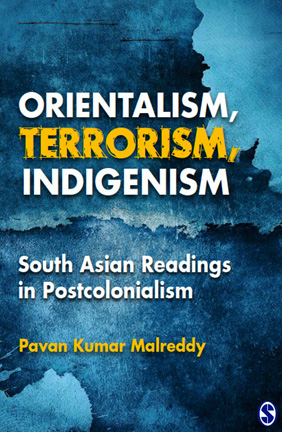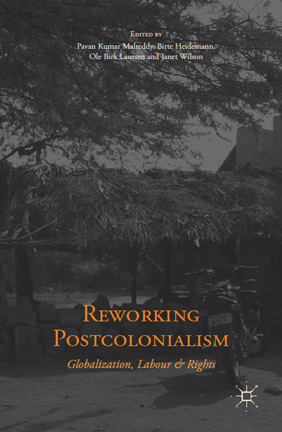
From 9/11 to the War on Terror – The Limits of Theory and Criticism
by Pavan Kumar Malreddy, Researcher in English Literature at Goethe University Frankfurt, and author of Orientalism,Terrorism, Indigenism: South Asian Readings in Postcolonialism (SAGE, 2015). We thank the author for generously contributing this article.
In 2003, I vividly remember encountering a group of six Mohawk Aboriginal men in a public park in Toronto, who summoned me to leave the “land of the Indian sons” at once, and then “go back to whichever the refugee camp” I came from. The men, who mistook me for “a refugee from Afghanistan”, would later make amends for their faux pas upon learning that I too am Indian (albeit, of some other kind) and would go on sharing jokes about what would have happened if Columbus fell from the edge of the Earth, or simply sailed in a circle and ended up rediscovering Spain.
In the post-9/11 climate of racial anxieties, this encounter had a curious yet lasting impact upon my thinking on the limits of postcolonial theory. Up until 9/11, Orientalism has been understood in a rather linear and modular fashion, as a discursive caveat that harnessed and justified colonial enterprise, including its pseudo-humanist aspirations. Said’s work, despite its ambitious scope, did not have much impact outside of literary studies and anthropology, nor has it been modified or extended to reflect the competing discourses of terrorism, security, rights, migration, and displacement. The Mohawk Indians or First Nations scholars, for instance, had probably little or no use for Said’s Orientalism, despite the fact they were both subjected to, and evidently subjectivised by, the popular Orientalism of the post-9/11 epoch.
Although the critics of Orientalism have gained a new ground since Said’s untimely death in 2003, none of them offered a substantial revision or reconceptualization of Said’s work. It is against this theoretical aporia that I became interested in the critiques of Orientalism and their potential contributions for a better understanding of post-9/11 racial and cultural anxieties, which I examined in my monograph Orientalism, Terrorism, and Indigenism: South Asian Readings in Postcolonialism (SAGE, 2015).
Building on Gyan Prakash’s distinction on “the opposition between the stability of synchronicity and the instability of diachrony,” (1995, 207) in Said’s work, and Hamid Dabashi’s (2009, 213) reading on the diffusion of Orientalism into multiple, disposable (“use and throw”) discourses, I propose a typology of multiple yet competing Orientalisms – from “counter-Orientalism” and “traveling Orientalism” to “pulp Orientalism” – in the first section of the book. In the subsequent section – “Disjunctures” – I examine the legacy of Orientalism to humanities and social sciences, especially its role in shaping and instituting the field of postcolonial studies. As such, I identify a critical disjuncture between partisanism and universalism, which is also expressed in postcolonial studies’ anxieties in grounding itself as a discipline while simultaneously challenging the disciplinary hegemony of the western academy.
In the final section of the book – “Indigenisms” – I turn to postcolonial theory’s ability to articulate cultural politics that are “partisan” and “nativist” in character, but remain complicit in the language of humanism, cosmopolitanism and rights. For instance, in my experience of working with Indigenous institutions in Canada, I have encountered a great deal of reluctance for, if not outright rejection of, theorists such as Spivak, Bhabha or Said by Aboriginal educators, scholars, and activists who considered theoretical models build on postcolonial societies to be inadequate, as they did not address the concerns of settler colonial societies such as Canada.
Hence, many Aboriginal scholars hold the view that postcolonial theory, with its European roots and residual Eurocentrism, lacks both the epistemic and experiential tools for understanding Indigenous conceptions of spirituality, collectivity, cosmology, ecology, and holistic thinking. I address these tensions in the last three essays of the book, while advancing new conceptual categories such as “Indigenous humanism”, “locopolitanism”, and “nationalogues”. Taken together, these conceptual interventions forge a “post-Eurocentric” perspective that serves as a mediating ground between the European tradition of liberty, humanity and rights, and non-European conceptions of collectivity, locality and “worlding from below”.
In my recent co-edited collection (with Birte Heidemann, Ole Birk Laursen, and Janet Wilson), Reworking Postcolonialism: Globalization, Labour and Rights (Palgrave Macmillan, 2015), I’ve expanded my interest in local universalisms to the emergence of multiple subject positions of labour (as opposed to wage labour), citizenship, and rights in an age of terror, precarity, and political upheavals.
In my forthcoming book project, tentatively titled Towards Post-Terrorism: Necro-Nationalism and Cultures of Violence in Insurgency Literature, I shift my focus from 9/11 to “war on terror” and its ancillary discourses such as “eco-terrorism” and “energy security”. Moving away from the event-centrism (“event theory”) of 9/11, I am to document the responsive violence to terrorism, which has far-reaching effects on the armed conflicts in the postcolonial world that were typically classified as “internal security problems” of their respective nation-states.
The insurgencies in India, Nigeria, and Burma are among the prime examples that have been systemically absorbed into the “war on terror” discourse, which my study investigates through a combination of literary and ethnographic sources. Incidentally, it is only in the aftermath of the 9/11 attacks that the literary output on insurgencies from India, Nigeria, and Burma has witnessed a steady rise. Despite the fact that the ethno-nationalist, revolutionary, and secessionist violence in the three countries had a long history of political grievances since the formal end of colonialism, they have been dramatically recast as “resource conflicts” in the wake of the “war on terror” campaign.
In the context of civil wars, separatists or revolutionary conflicts, literary texts have the capacity to play a trans-forming role in debunking the propagandaic nature of the political discourse(s) from both ends of the spectrum – states and revolutionaries –, owing largely to the rhetorical and imaginative qualities inherent to their form. Accordingly, my project constructs a hitherto unfounded category of “insurgency literature” through a genealogical investigation of colonial uprisings, peasant rebellions, and resource conflicts of the 20th and 21st centuries.
In that sense, my coinage of “post-terrorism” serves both as a theoretical commitment and an ethical gesture to register multiple modalities of violence that cannot be reduced to singular categorization, but can only be understood in relation to their respective national (“necro nationalism”) and cultural (“cultures of violence”) contexts. In essence, the project holds that misrecognizing certain forms of violence as “terrorism” can have devastating political and ethical effects; once the so-called “terrorist” is deprived of all other means of conciliation, the very act of “labeling” political violence could lead individuals or groups to embark on an adverse path towards terrorism.
© Pavan Kumar Malreddy
————————————


——————————–
Pavan Kumar Malreddy is a Researcher in English Literature at Goethe University Frankfurt. He is the author of Orientalism, Terrorism, Indigenism: South Asian Readings in Postcolonialism (SAGE, 2015) and co-editor of Reworking Postcolonialism: Globalization, Labour and Rights (Palgrave, 2015). He has co-edited special issues with the Journal of Postcolonial Writing (2012) and ZAA: Journal of English and American Studies (2014), and has authored over twenty academic essays and chapters on terrorism and postcolonial theory in journals such as The European Legacy, Third World Quarterly, Journal of Postcolonial Writing and Intertexts.
Flipkart: http://www.flipkart.com/orientalism-terrorism-indigenism-english/p/itme6san6yphsmuc?pid=9789351501428
Amazon: http://www.amazon.in/s/?field-keywords=9789351501428

